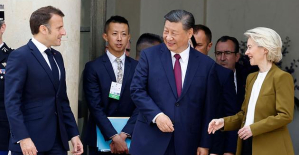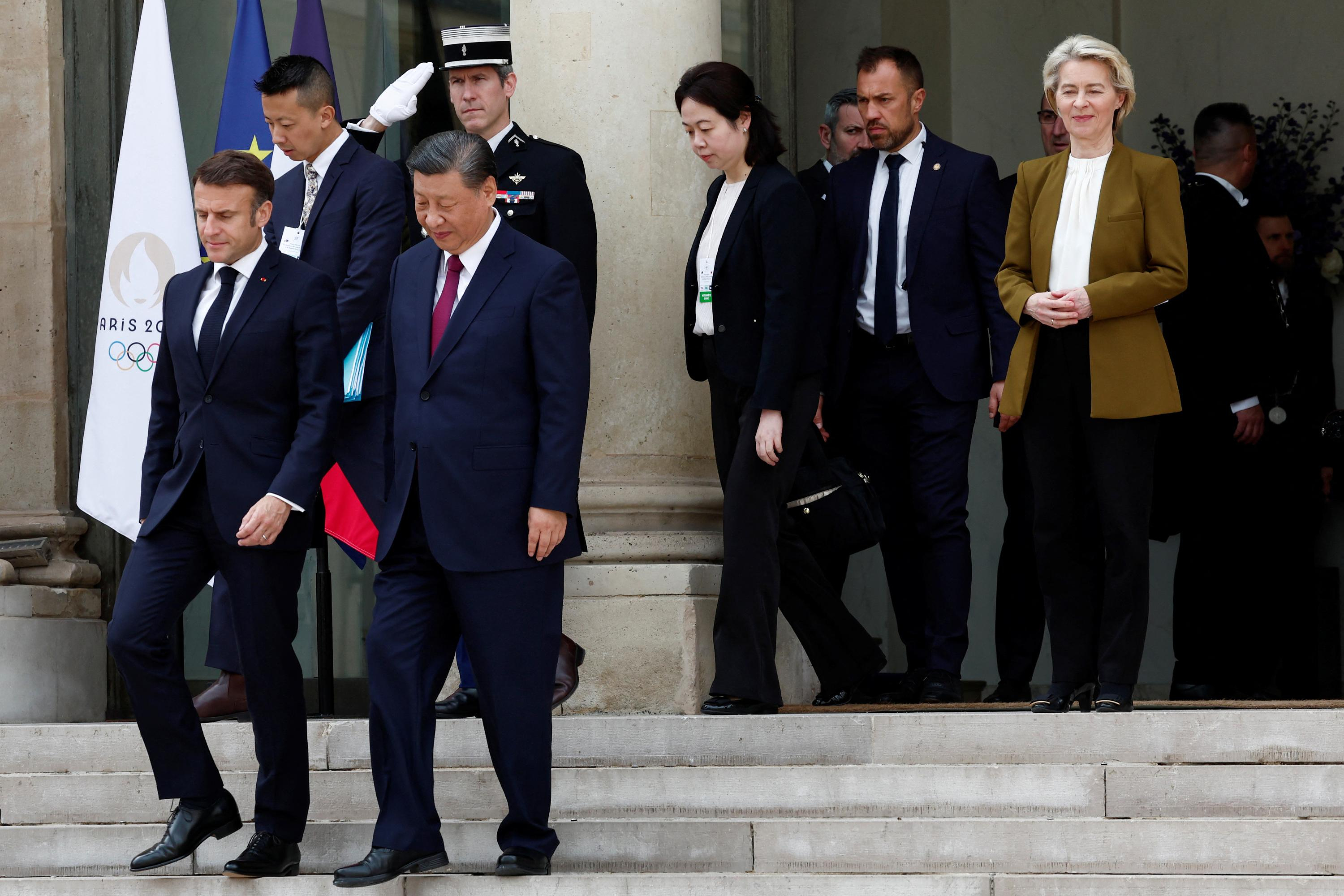In 2022, Mirwais published The Almighty, a stunning dystopian novel of rare power. An author was born, who today published a book less surprising but just as fascinating since he returns to the adventure of his youth, the group Taxi Girl. An epic as seductive as it is tragic, told with a distinguished pen, which brings to life an era of all possibilities for French rock: the end of the 1970s and the beginning of the 1980s.
“We were in the middle of post-adolescent emotional chaos, with testosterone because we were guys,” summarizes Mirwais Ahmadzaï, in his early sixties, adding that “the idea was to make something literary out of it.” The work is of a much higher level than that of the books by musicians published by the dozens since Keith Richards' autobiography in 2010. Only the story of Pete Townshend, leader of The Who, can claim a certain literary ambition. “We covered “Substitute” and “My Generation” with Taxi Girl at the beginning,” explains Mirwais, flattered by the comparison.
The difference is that Mirwais is not a tired rock star, but a respected musician, recognized and preserved from the throes of world fame. With his second solo album, Production, in 2000, the man left his mark on the history of electronic music. His collaboration with Madonna for four albums and a few enduring hits (Music, Don't Tell Me, Die Another Day, etc.) protected him from want until the end of his days.
Also read: Pete Townshend: “To continue The Who, we needed new songs”
Alfred Hitchcock explained that the better the villain's character, the better the film. A remark that can be easily applied to Mirwais' story. The Manager is an anthology villain, with the notable difference that he is a real character. “I don’t know if he was a real bad guy but he was a real crook. A completely legendary guy who told us he was going to Japan to start a new life and who stayed when he saw that Look for the Boy was becoming a hit.” This brilliant song is indeed the Taxi Girl classic, with its synth motif borrowed from the English group Magazine, and a text that is very advanced on sexual ambiguity.
“We were very young, and not very well surrounded. It was the end of the seventies, a super tough time, there was something abrasive in the air. The adolescent rage that was ours, we find it in rap now,” confides Mirwais. Isolated, discreet, quite solitary, the man scrutinizes the era with great acuity, which gives a sociological and political dimension to his story, with real class consciousness.
“I arrived from Afghanistan at the age of 6, in 1966. I come from a family of senior executives. My father was one of the first Afghans sent to Europe. He met my mother, an Italian, in Lausanne. After completing HEC, he returned to the country. He gave up a very high position to open an Afghan clothing store in Paris. I had the status of political refugee until 2010..." Which allowed him to escape military service, and made it possible to keep Taxi Girl alive, after having met the members of the group at high school, with Daniel Darc, who will be reformed P4.
Also read: The Nuc plus ultra: young French rockers and veterans The Who
Mirwais is a storyteller of sometimes shocking honesty in the realm of pretenses and permanent lies. It was well away from showbiz that this guitarist who switched to machines developed his uniqueness. The book is halfway between a form of pride and a strong feeling of waste regarding the potential of Taxi Girl. “We arrived just after punk, at a time marked by the war in Afghanistan and the assassination of John Lennon. We felt close to Kraftwerk, who had anticipated the robotization of society and we dove into it.” Crazy modern, Taxi Girl's records owe a lot to Maxime Schmitt, who was a bit like the fifth member of the German group.
“Nowadays people love Taxi Girl, but back then we were scary.” The active circulation of heroin within the group earned them a sulphurous reputation while the group embodies the future of French music. “We concentrated a lot of jealousy too,” admits Mirwais, who saw his dream disappear the day the drummer, Pierre Wolfsohn died of an overdose, at 20 years old. It would take two decades for Mirwais to establish himself under his sole name and achieve international success. But this is another story.
In addition to this work devoted to the period 1978-1981, Mirwais is writing a second volume devoted to the years 1982 to 1986, the second part of Taxi Girl's career. A final volume will be devoted to the sequel, notably his fruitful collaboration with Madonna. The man is, to date, the musician who has worked most closely with the superstar. “Madonna is not at all who we imagine in everyday life. People would be surprised, he explains about the one who is now an intimate. I got into electronic music around 1992, but it took me 6 years to get signed to a record label. I was considered a has-been when Naïve, a new label, offered me a contract in 1998, when French Touch was launched. If he is not strictly part of the movement, the forty-year-old then becomes a planetary reference. “I had a contract with Sony Music for the UK market and was looking to break into the US on Madonna's label, Maverick. That’s how she heard my work.”
Today we expect Mirwais to offer new titles. “I have lots of pieces but the conditions are not right. I don't want to be devoured by the ogre Spotify. It would be nice if there was a label that would put things straight on the artistic side. This is the first time in history that the general public has been domesticated by prescribers.”

 “Mom, Dad, please don’t die”: in the United States, a nine-year-old child saves the lives of his parents injured in a tornado
“Mom, Dad, please don’t die”: in the United States, a nine-year-old child saves the lives of his parents injured in a tornado War in Ukraine: Putin orders nuclear exercises in response to Macron and “Western leaders”
War in Ukraine: Putin orders nuclear exercises in response to Macron and “Western leaders” Mexico: the last moments of surfers found in a well, killed with a bullet to the head
Mexico: the last moments of surfers found in a well, killed with a bullet to the head Emmanuel Macron and Ursula von der Leyen display their firmness against Xi Jinping
Emmanuel Macron and Ursula von der Leyen display their firmness against Xi Jinping A baby whose mother smoked during pregnancy will age more quickly
A baby whose mother smoked during pregnancy will age more quickly The euro zone economy grows in April at its best pace in almost a year but inflationary pressure increases
The euro zone economy grows in April at its best pace in almost a year but inflationary pressure increases Children born thanks to PMA do not have more cancers than others
Children born thanks to PMA do not have more cancers than others Breast cancer: less than one in two French women follow screening recommendations
Breast cancer: less than one in two French women follow screening recommendations French private sector activity rebounded in April thanks to services
French private sector activity rebounded in April thanks to services “Helldivers 2” player revolt forces Sony to backtrack
“Helldivers 2” player revolt forces Sony to backtrack Energy check: have you not received the aid even though you think you are eligible? A complaints counter will open... in July
Energy check: have you not received the aid even though you think you are eligible? A complaints counter will open... in July Automobile: France will be electric, reaffirms Bruno Le Maire
Automobile: France will be electric, reaffirms Bruno Le Maire Vienna, Paris, Milan celebrate the 200th anniversary of Beethoven's 9th Symphony
Vienna, Paris, Milan celebrate the 200th anniversary of Beethoven's 9th Symphony Cannes Film Festival: call for strike one week before opening
Cannes Film Festival: call for strike one week before opening Wonder Woman stuntwoman Jeannie Epper dies at 83
Wonder Woman stuntwoman Jeannie Epper dies at 83 “We had to remove the baccalaureate, considered too difficult”: when the Unknowns made fun (gently) of Bernard Pivot
“We had to remove the baccalaureate, considered too difficult”: when the Unknowns made fun (gently) of Bernard Pivot Omoda 7, another Chinese car that could be manufactured in Spain
Omoda 7, another Chinese car that could be manufactured in Spain BYD chooses CA Auto Bank as financial partner in Spain
BYD chooses CA Auto Bank as financial partner in Spain Tesla and Baidu sign key agreement to boost development of autonomous driving
Tesla and Baidu sign key agreement to boost development of autonomous driving Skoda Kodiaq 2024: a 'beast' plug-in hybrid SUV
Skoda Kodiaq 2024: a 'beast' plug-in hybrid SUV The home mortgage firm rises 3.8% in February and the average interest moderates to 3.33%
The home mortgage firm rises 3.8% in February and the average interest moderates to 3.33% This is how housing prices have changed in Spain in the last decade
This is how housing prices have changed in Spain in the last decade The home mortgage firm drops 10% in January and interest soars to 3.46%
The home mortgage firm drops 10% in January and interest soars to 3.46% The jewel of the Rocío de Nagüeles urbanization: a dream villa in Marbella
The jewel of the Rocío de Nagüeles urbanization: a dream villa in Marbella Facing Jordan Bardella, the popularity match turns to Gabriel Attal’s advantage
Facing Jordan Bardella, the popularity match turns to Gabriel Attal’s advantage Europeans: a senior official on the National Rally list
Europeans: a senior official on the National Rally list Blockade of Sciences Po: the right denounces a “drift”, the government charges the rebels
Blockade of Sciences Po: the right denounces a “drift”, the government charges the rebels Even on a mission for NATO, the Charles-de-Gaulle remains under French control, Lecornu responds to Mélenchon
Even on a mission for NATO, the Charles-de-Gaulle remains under French control, Lecornu responds to Mélenchon These French cities that will boycott the World Cup in Qatar
These French cities that will boycott the World Cup in Qatar PSG-Dortmund: “Calm”, Mbappé, “like an orchestra”… Luis Enrique gives the keys to the match
PSG-Dortmund: “Calm”, Mbappé, “like an orchestra”… Luis Enrique gives the keys to the match Bundesliga: Kingsley Coman resumed racing five weeks before Euro 2024
Bundesliga: Kingsley Coman resumed racing five weeks before Euro 2024 Ligue 1: Dembélé, Lacazette and Aubameyang, nominated for the best player of the month of April
Ligue 1: Dembélé, Lacazette and Aubameyang, nominated for the best player of the month of April Top 14: at what time and on which channel to follow Perpignan-Clermont?
Top 14: at what time and on which channel to follow Perpignan-Clermont?


















